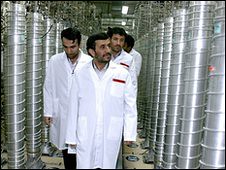
Iranian President Mahmoud Ahmadinejad has been targeted by the western imperialist states for regime change. The People's Republic of China has rejected calls for new sanctions in the United Nations Security Council., a photo by Pan-African News Wire File Photos on Flickr.
IAEA expresses ‘serious concerns’ as Iran boosts nuclear work
Tuesday, 06 March 2012 00:00
Nigerian Guardian
AS Iran tripled its monthly production of higher-grade enriched uranium, the United Nations’ (UN) nuclear watchdog, International Atomic Energy Agency (IAEA), has expressed “serious concerns” about possible military dimensions to Tehran‘s atomic activities.
The agency’s director general, Yukiya Amano, also yesterday told the IAEA‘s 35-nation board of governors about the lack of progress in two rounds of talks between the Vienna-based body and Tehran this year.
Evidence of ongoing activities at an Iranian military base suspected of being involved in testing related to nuclear weapons makes inspectors eager to get there as soon as possible, the head of the IAEA said.
Speaking to reporters during the agency’s board of governors meeting, Amano declined to provide details on whether the activities at the Parchin military base involve ongoing testing or efforts to remove evidence.
“But I can tell you that we are aware that there are some activities at Parchin and it makes us believe that going there sooner is better than later,” Amano said.
IAEA inspectors had asked to visit the facility during a February trip to Iran but were rebuffed, according to the agency.
This came as the United States (U.S.) President Barack Obama and Israeli Prime Minister Benjamin Netanyahu met in Washington to discuss Iran, deeply at odds over the timing for possible last-resort military action against Iran’s nuclear programme.
Even though Obama offered assurances of stiffened U.S. resolve against Iran before the White House meeting, the two allies remained far apart over explicit nuclear “red lines” that Tehran should not be allowed to cross.
Iran denies suspicions that it is covertly seeking nuclear weapons capability, in part by coordinating efforts to process uranium, test high explosives and revamp a ballistic missile cone to accommodate a nuclear warhead.
But its refusal to curb sensitive atomic work that can have both civilian and military applications has drawn increasingly tough UN and Western sanctions against the major oil producer.
During the meetings in the Iranian capital in January and February, Iranian officials stonewalled the IAEA’s requests for access to a military site seen as central to its investigation into the nature of the Islamic state’s nuclear activity.
“The agency continues to have serious concerns regarding possible military dimensions to Iran’s nuclear programme,” Amano told the closed-door meeting, according to a copy of his speech.
The IAEA “is unable to provide credible assurance about the absence of undeclared nuclear material and activities in Iran, and therefore to conclude that all nuclear material in Iran is in peaceful activities,” he added.
A report by the IAEA to member states last month said Iran was significantly stepping up uranium enrichment, a finding that sent oil prices higher on fears that tensions between Tehran and the West could boil over into military conflict.
Since the IAEA’s previous report in November, Amano said Iran has tripled monthly production of uranium refined to a fissile concentration of 20 percent - well above the level usually needed to run nuclear power plants.
Though indicated by the IAEA’s confidential report last month, it was the first time Amano spoke in public about this rapid increase in Iran’s enrichment activities, which has stoked Western and Israeli suspicions about Tehran’s nuclear agenda.
The Islamic Republic said the more highly refined uranium will replenish the dwindling special fuel stocks of a Tehran reactor that produces medicinal isotopes.
No comments:
Post a Comment